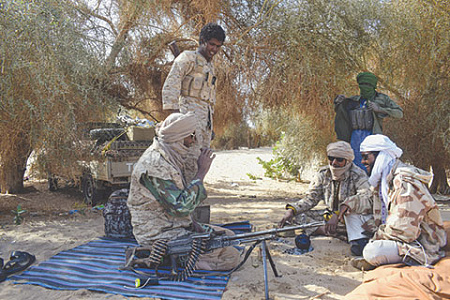
The countries of the Confederation of Sahel States (Mali, Burkina Faso and Niger) recalled their ambassadors from Algeria after the Algerians shot down a Malian reconnaissance drone. Mali accuses its neighbor of supporting terrorism, expressed in an attempt to disrupt a military operation against Tuareg rebels. Algeria claims that the drone was shot down because it illegally crossed the border. Against this background, France and Algeria are almost done with the old quarrel. The Confederation of Sahel States, on the contrary, tends towards Russia and has difficult relations with the West.
There is no talk of a complete severance of ties with Algeria yet. The ambassadors have only been summoned for consultations. However, the countries of the Confederation, led by the military, have repeatedly shown that they are capable of acting in an army-like manner. Consequently, there is a possibility that the conflict will get some kind of continuation – in the worst case scenario, in the form of hostilities. So far, the authorities of Mali, Burkina Faso and Niger have limited themselves to harsh rhetoric. They called the actions of the Algerian military “an irresponsible act that violates international law.”
“The heads of State of the Confederation regret the destruction of a drone of the armed forces of the Republic of Mali as a result of a hostile act by the Algerian regime on the night of March 31 to April 1 in Tinzahuaten, in the Kidal region,” the three Sahel countries said in a joint statement.
The Malian town of Tinzahuaten, adjacent to the Malian-Algerian border, became widely known in July 2024, when the feeds of world news agencies were filled with reports of a battle near it between, allegedly, Russians and jihadist formations, as well as a Tuareg separatist group, one of several fighting for the creation of an independent Tuareg state of Azawad. According to the Malian authorities, the drone was carrying out a mission as part of an operation by government forces in the area and was unexpectedly attacked from the Algerian side. It is reported that the incident occurred 9.5 km from the border, deep in the Malian territory. According to the Algerian version, the drone was shot down, on the contrary, when it invaded 2 km into Algerian airspace.
The Malian authorities announced that they would file a complaint against their neighbor to “international authorities.” In addition, they withdrew from the joint regional security group with Algeria. The Prime Minister of Mali, Abdoulaye Maiga, went even further in his judgments and said that the incident was “proof of the involvement of Algerians in the financing of international terrorism.” With such a degree of verbal rhetoric, a complete break in relations is becoming more and more likely to result in a diplomatic conflict. On the other hand, it is possible that the prime minister will soon win back. His predecessor, Schogel Maiga, was also far from always careful in his expressions and often publicly voiced conspiracy theories. However, under him, relations with the country’s neighbors did not reach an open, especially armed, conflict.
The emotional reaction to the drone’s destruction is understandable. If Algeria is really fighting on the side of the rebels, then this may change the nature of the fighting with them. The armies of Mali, Burkina Faso and Niger, which are fighting against separatists and Islamists instead of the French troops withdrawn from the region, have relied on air strikes. The enemy, due to the lack of necessary weapons, can do little against them. Very successful cases of drones have already been recorded. In December 2024, eight Tuareg elders were killed by a drone attack, including the influential field commander Fahad Al-Mahmoud.
The situation is particularly complicated by the fact that the incident in Tinzahuaten coincided with a major change in Algeria’s foreign policy. In 2022, the Algerians recalled their ambassador from Spain, and then from France. The reason in both cases is essentially the same: Madrid and Paris did not take their side in the long-standing dispute with Morocco, which has been dragging on since the 1970s. France and Spain have actually recognized Western Sahara as Moroccan. Algeria believes that this territory is illegally occupied. The Algerian Foreign Ministry even called Western Sahara “the last colony in Africa.” As a result of lengthy arguments demanding apologies and repentance, Algeria had few European allies. However, Italy made a fuss – Prime Minister Giorgia Meloni did not miss the opportunity to establish economic cooperation with a hydrocarbon-rich country. Algerian oil and gas still played their own, so to speak, peacemaking role. Because of them, as well as because of the need to cooperate in the fight against illegal migration, France and Spain tried to establish relations with the country. The Algerian ambassadors returned to Madrid and Paris. And on April 6, 2025, French Foreign Minister Jean-Noel Barraud held a meeting with Algerian President Abdelmajid Tebboune, where the parties agreed to fully restore relations. It was against this background that the incident with the drone occurred.
